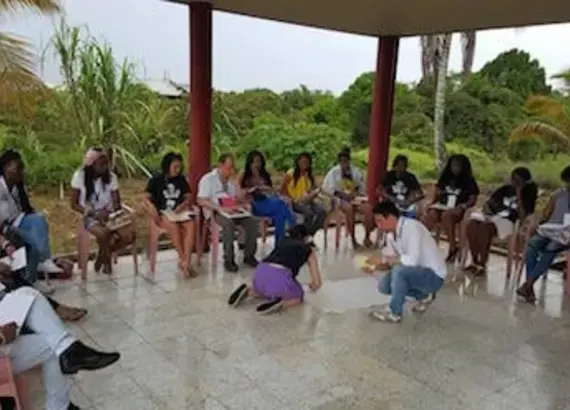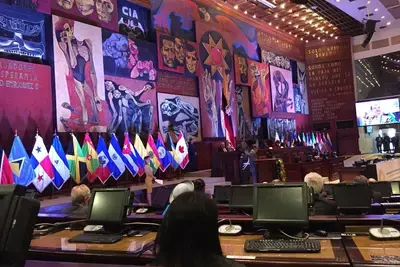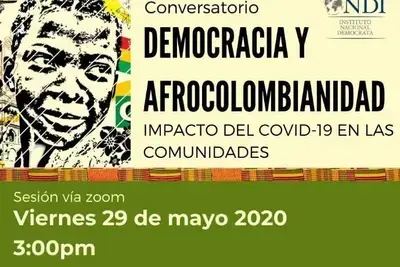
Success Story
Historic Peace Agreement Reached in Colombia; Still Subject to October Referendum
On August 24, after 52 years of armed conflict and four years of negotiations, the Government of Colombia (GOC) and the Revolutionary Armed Forces of Colombia (Fuerzas Armadas Revolucionarias de Colombia, FARC) announced that they reached an agreement to end the longest-running war in the Americas. The Colombian people will have the final word as to what the post-conflict environment will look like. A national plebiscite planned for October 2 in which people vote either “yes” or “no” will determine if the agreement will be implemented or not. Because voting turnout rates in Colombia have historically been low, Congress passed a bill lowering the required percentage of “yes” votes from 51 percent to 13 percent of all registered voters. Putting the final decision in the hands of the electorate makes the vote an exercise in civic participation and, if it passes, creates a foundation of public support on which to build peace.
The agreement is a controversial topic in Colombia, which is to be expected after so many years of war and with so many people directly affected by the conflict. Nevertheless, the agreement presents a huge opportunity for the country to begin rebuilding after a half century of conflict and has the potential to lay the groundwork for a peaceful future built on strong democratic institutions, inclusion, accountability and rule of law.
If the agreement is approved, both the Colombian government and the FARC still face major challenges moving forward. Thousands of guerrillas, many of whom have spent their whole lives with the FARC, will have to demobilize and reintegrate into civilian life, which will involve education and job training. The FARC as a group, having operated outside of the law for so long, will need to adapt to functioning within the political system if it wants to transition from an illegal armed group to a political party. At the same time, the government itself will need to quickly pass reforms in preparation for the implementation of the agreement and the FARC’s incorporation into the political system. One of the five key points agreed upon in the accords is that victims of the conflict have a right to truth, justice and a guarantee that they will not be re-victimized. To ensure that these rights are upheld, it will be crucial for the Colombian government to focus on implementing and strengthening its Victims Law, which stipulates that eight million registered victims are entitled to reparations -- including hundreds of thousands of displaced persons who have no home to return to. Civic education and participation, along with dialogue between different sectors of society, will be crucial to building and maintaining the peace, especially given how much mistrust exists among the involved parties and the general population.
Throughout the four years of negotiations between the Colombian government and the FARC, NDI has worked with local partners in Colombia to help consolidate the implementation of legislation that pertains to victims, political participation and electoral reform. NDI has helped prepare political and civic leaders to contribute to the implementation of peace accord policies and generate conditions for national reconciliation in post-conflict zones. In February 2015, NDI board member Bernard Aronson was selected by President Barack Obama and Secretary of State John Kerry to serve as the United States’ special envoy to the peace talks, which helped to expedite the finalizing of the accords.
To strengthen the implementation of the Victims Law, NDI has facilitated coordination between political parties and Colombia’s Victims Unit, and has worked with Victims Participation Roundtables (Mesas de Participación de Víctimas, VPRs) in seven of the country’s departments to increase the group’s capacity to advocate for reparations and representation. Recognizing that local officials have also been victims of the conflict, NDI has worked for several years on the process of collective reparations for legislators and city council members to further build and strengthen democracy in municipalities. Because peace will ultimately be constructed and maintained at the local level, NDI has worked with newly elected mayors and shared techniques to ensure that local strategic development plans promote peacebuilding, human rights and security. After the office of the Colombian president announced that the National Learning Service (Servicio Nacional de Aprendizaje, SENA), a public educational institution, would be responsible for training demobilized FARC soldiers to rejoin the labor force, NDI co-designed and implemented a training of trainers curriculum for SENA members. Currently, over 1,000 SENA officials in 28 departments have completed this course in preparation for their upcoming role as peace accord implementers.
Now that the peace accords have been finalized, NDI will promote citizen participation as a necessary component of peacebuilding by continuing to work with elected officials, journalists, victims’ groups and human rights activists at the national and local levels to facilitate discussions and education on political reforms. NDI also plans to work with political parties to facilitate their adaptation to the changes in the political system that will occur in a post-conflict environment. For the success of the peace process, it is also essential to address the needs of all citizens, including victims, Afro-Colombians, women and members of the LGBTI community.
These activities were conducted with support from the National Endowment for Democracy and Canada’s Department of Foreign Affairs, Trade and Development.
Published on August 30, 2016





